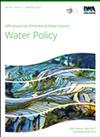Justice and sanitation governance: an enquiry into the implementation of the Swachh Bharat Mission-Rural programme in UP, India
IF 1.8
4区 环境科学与生态学
Q4 WATER RESOURCES
引用次数: 1
Abstract
The Swachh Bharat Mission-Rural (SBM-R) is a flagship programme aimed at ending open defecation in rural India. In this paper, we study institutions and processes using Amartya Sen's conception of justice. We review the outcomes by assessing agencies, actions and processes involved in the implementation of the SBM-R programme. The findings are analysed using the Sanitation Well-being Framework. Sanitation well-being is achieved when an individual is able to experience the sanitation life cycle stages of acceptance, construction, utilisation and maintenance of safe disposal, which are part of the framework. The capability factors grouped under personal, cultural, structural, environmental and service elements of the framework determine the sanitation environment facilitated by the state. Failure in experiencing one of the life stages leads to slippage in sanitation, where people resume open defecation, despite possessing toilets. The paper presents a review of literature on the political, technological and structural issues in programme implementation, followed by an analysis of 42 interviews and 12 focused group discussions of state and non-state actors conducted in rural Shravasti, Uttar Pradesh, India. We found that slippage is prevalent in the field site and identified 26 capability factors (expansion and constraints) that led to slippage in sanitation.司法和卫生治理:对印度UP Swachh Bharat使命农村方案执行情况的调查
Swachh Bharat Mission Rural(SBM-R)是一项旨在结束印度农村露天排便的旗舰计划。本文运用阿马蒂亚·森的正义观来研究制度和过程。我们通过评估参与实施SBM-R计划的机构、行动和流程来审查结果。使用卫生福利框架对调查结果进行了分析。当个人能够经历安全处置的验收、施工、使用和维护的卫生生命周期阶段时,卫生福利就实现了,这是框架的一部分。该框架的个人、文化、结构、环境和服务要素下的能力因素决定了国家促进的卫生环境。如果没有经历人生的某个阶段,就会导致卫生设施的恶化,尽管人们拥有厕所,但仍会恢复露天排便。本文回顾了有关方案执行中的政治、技术和结构问题的文献,然后分析了在印度北方邦什拉瓦斯蒂农村进行的42次采访和12次国家和非国家行为者的重点小组讨论。我们发现现场普遍存在滑动现象,并确定了导致卫生设施滑动的26个能力因素(扩展和限制)。
本文章由计算机程序翻译,如有差异,请以英文原文为准。
求助全文
约1分钟内获得全文
求助全文
来源期刊

Water Policy
环境科学-水资源
CiteScore
3.10
自引率
12.50%
发文量
81
审稿时长
6-12 weeks
期刊介绍:
Water Policy will publish reviews, research papers and progress reports in, among others, the following areas: financial, diplomatic, organizational, legal, administrative and research; organized by country, region or river basin. Water Policy also publishes reviews of books and grey literature.
 求助内容:
求助内容: 应助结果提醒方式:
应助结果提醒方式:


